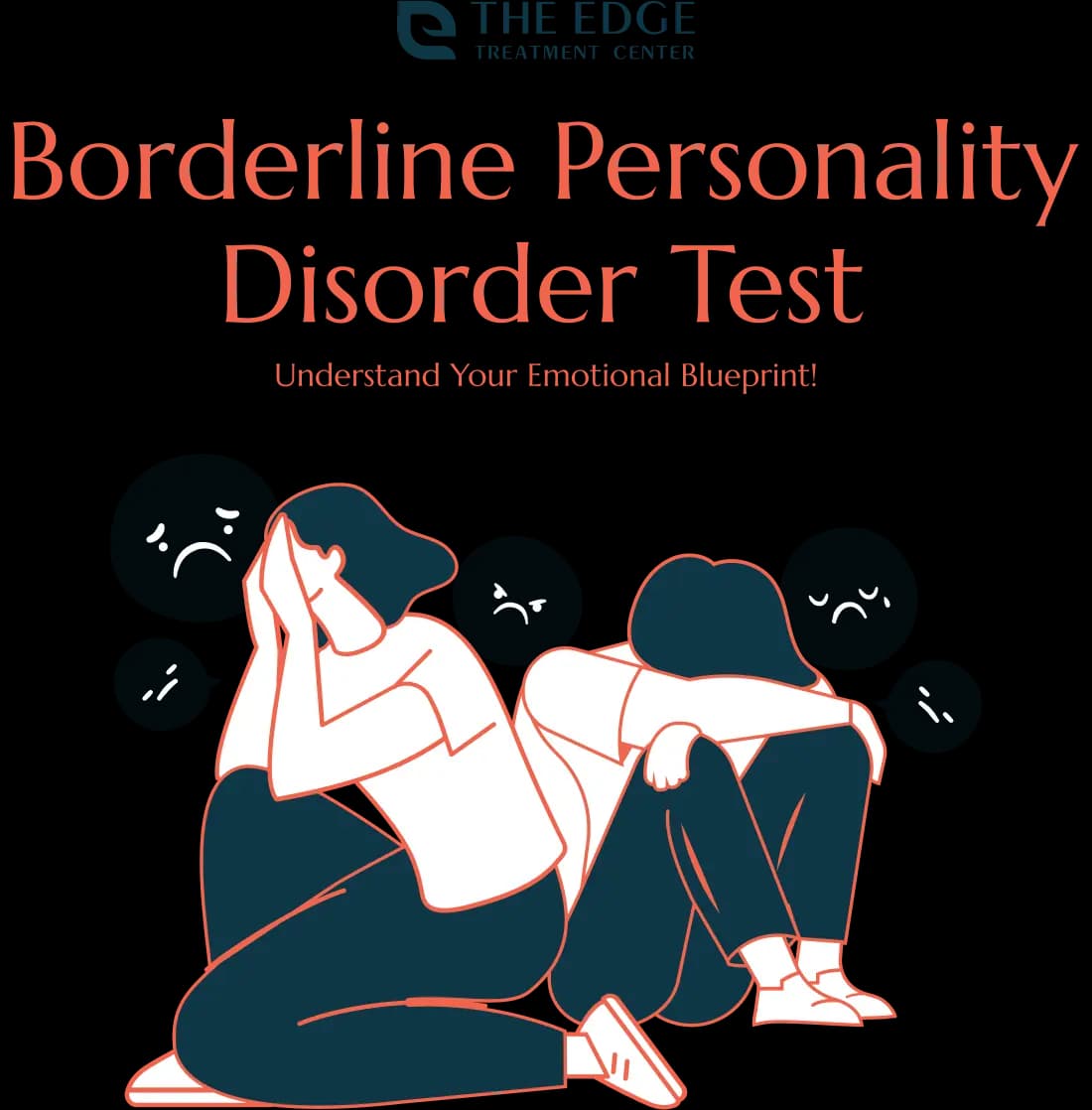The Edge Treatment Center
Borderline Personality Disorder Test: Explore Your Feelings

Borderline Personality Disorder (BPD) presents complex challenges, including emotional instability, intense relationships, and a fluctuating sense of self.
Reach out to us if you're seeking clarity about your experiences or suspect they might align with those of BPD.

Take the BPD Test Now
This test is designed for those who are looking for insights into their emotional patterns, relationship dynamics, and self-image concerns that might relate to BPD. By answering these questions honestly, you can gain a preliminary understanding of your experiences in relation to this disorder.
Please answer the following questions based on how you have felt and behaved over the past few months.
The Edge Treatment Center
Recognizing Symptoms of BPD
Borderline Personality Disorder (BPD) is marked by emotional instability, intense interpersonal relationships, and a distorted self-image. It can lead to significant distress or impairment in friendships, work, and family life. Some of the symptoms people experience are:
Fear of Abandonment
Individuals with Borderline Personality Disorder (BPD) often exhibit a persistent fear of being abandoned by loved ones. This fear can trigger intense emotions and lead to impulsive actions.
Unstable Relationships
BPD sufferers frequently struggle with maintaining stable relationships due to their intense emotional fluctuations and unpredictable behaviors. This instability can strain interpersonal connections.
Impulsivity and Intense Anger
BPD may manifest in impulsive behaviors such as reckless driving, substance abuse, or binge eating. Moreover, individuals with BPD often experience sudden bursts of anger that are disproportionate to the situation.
Feelings of Emptiness
A common symptom of BPD is the profound sense of emptiness that individuals experience. This feeling can be overwhelming and contribute to self-destructive behaviors.
Self-Harming Behaviors
People with BPD might engage in self-harming activities like cutting or burning themselves as a way to cope with emotional distress. These behaviors serve as a temporary relief but can be harmful in the long run.
Sudden Mood Swings
Individuals with BPD often struggle with extreme mood swings, shifting rapidly from euphoria to deep sadness or anger. These fluctuations can disrupt daily life and relationships.
If you find yourself wondering whether your experiences align with those characteristic of BPD, you're not alone. Many seek answers to their feelings and behaviors, and our "Borderline Personality Disorder Test" is designed to help guide your understanding of BPD symptoms.
The Edge Treatment Center
Importance of Early Intervention
Early intervention is key in managing high-functioning BPD. Without timely recognition and treatment, individuals may struggle with relationships and work-related stressors.
Supportive therapy tailored to address specific symptoms can significantly improve the quality of life for those with high-functioning BPD. The sooner you act the sooner you can overcome this tricky disorder, reach out to us to learn about our individualized treatment.

We’re Here To Help You Find Your Way
Let us lead you through a tailored treatment plan designed for your unique needs.
Understanding Borderline Personality Disorder Quiz
The BPD quiz typically covers aspects like impulsivity, unstable relationships, and intense emotions. It offers a snapshot of potential symptoms and challenges associated with borderline personality disorder.
Importance: taking a borderline personality disorder quiz can help individuals gain insights into their emotional experiences and behaviors. By answering questions related to BPD symptoms, individuals can assess the likelihood of having this personality disorder.
Limitations: It's essential to remember that while a BPD quiz can be informative, it should not replace a professional evaluation. Only a qualified mental health professional can provide an accurate diagnosis based on comprehensive assessments.
The Edge Treatment Center
Instructions for Taking the BPD Test
Preparation Tips
Before starting the BPD test, find a quiet and comfortable space to focus on the questions. Ensure you are in a calm state of mind to provide accurate responses.
It's crucial to approach the test with an open mind and be honest with yourself while answering each question. Remember, there are no right or wrong answers; just share your true feelings.
Answering the Questions
Read each question carefully, taking your time to reflect on how you truly feel. Avoid rushing through the test; thoughtful responses lead to more precise results.
When responding, think about your emotions, thoughts, and behaviors over an extended period rather than focusing on a specific moment. This broader perspective helps in capturing the essence of your personality traits accurately.
Seeking Support
Encourage your friends or family members to take the BPD test as well. By involving loved ones, you can gain insights from their perspectives and experiences, enhancing the overall accuracy of the results.
Discussing the BPD test outcomes with trusted individuals can also provide emotional support and facilitate open conversations about mental health. Remember, seeking help and sharing experiences is a sign of strength.
After Completing the Test
Once you have completed the Borderline Personality Disorder test, take some time to reflect on your responses. Consider seeking professional guidance if you have concerns about the results or wish to explore further.
Remember, we can help you overcome the symptoms and you can recover. The quicker you start the better you’ll be on the long run. Reach out to us now, we’re here for you 24/7!

Accuracy and Reliability of BPD Tests
Preliminary Evaluation: BPD tests serve as a preliminary step in assessing potential mental health concerns. They provide individuals with insights into their emotional well-being.
BPD tests are designed to offer an initial assessment of symptoms commonly associated with the disorder. These assessments can help individuals recognize patterns in their behavior.
Professional Assessment: while BPD tests can indicate the presence of certain traits, they are not diagnostic tools. It is essential to understand that only a qualified mental health professional can provide an accurate diagnosis.
Individuals who suspect they may have borderline personality disorder should seek professional evaluation. A healthcare provider will conduct a thorough assessment to determine an appropriate treatment plan.
Discussion with Healthcare Provider: the results of BPD tests should be viewed as a starting point for discussion with a healthcare provider. They can help individuals articulate their concerns and experiences more effectively.

We’re Here To Help You Find Your Way
Let us lead you through a tailored treatment plan designed for your unique needs.
The Edge Treatment Center
Differentiating BPD From Other Conditions
Interpersonal Instability
Borderline personality disorder (BPD) is distinct from bipolar disorder and post-traumatic stress disorder (PTSD). Individuals with BPD often struggle with intense, unstable relationships due to fear of abandonment.
BPD manifests through impulsivity in areas like spending, sex, substance abuse, and reckless driving. This impulsivity sets it apart from other mental health conditions.
Diagnosing Criteria
The diagnosis of BPD relies on specific criteria outlined in the Diagnostic and Statistical Manual of Mental Disorders (DSM-5). These criteria mainly focus on interpersonal instability and impulsivity, which are core features of the disorder.
Individuals with BPD tend to have a distorted self-image, engage in risky behaviors, and experience severe mood swings. These characteristics help differentiate BPD from other disorders.
Importance of Accurate Diagnosis
Accurate diagnosis is crucial for individuals with BPD as it ensures they receive appropriate treatment. Misdiagnosis can lead to ineffective interventions that may worsen symptoms or delay recovery.
Effective treatment for BPD typically involves a combination of therapy, medication, and support services tailored to address the unique challenges faced by individuals with the disorder.
The Edge Treatment Center
Long-Term Outlook for Individuals with BPD
The journey with borderline personality disorder (BPD) is deeply personal and varies from one individual to another. However, with the right treatment and support, many individuals can look forward to a future of improvement and hope.

Treatment Options
Individuals diagnosed with borderline personality disorder (BPD) can experience significant improvements in their long-term outlook through various treatment options. Psychotherapy is a cornerstone in managing BPD, helping individuals develop coping mechanisms and improve interpersonal relationships
Medication may also be prescribed by a mental health professional to address specific symptoms such as depression or anxiety. However, it is essential to note that medication alone is not considered a primary treatment for BPD but rather used in conjunction with therapy.

Strategies for Managing Symptoms
To effectively manage BPD symptoms in the long term, individuals can benefit from incorporating certain strategies into their daily lives. Dialectical behavior therapy (DBT) has shown promising results in helping individuals regulate emotions and reduce impulsive behaviors commonly associated with BPD.
Moreover, practicing mindfulness techniques can aid in increasing self-awareness and emotional regulation. Engaging in regular physical exercise and maintaining a healthy lifestyle are also crucial components of symptom management for individuals living with BPD.

Importance of Ongoing Support
Continuous support and therapy play a pivotal role in enhancing the quality of life for individuals with BPD. Building a strong support network that includes understanding friends, family members, and mental health professionals can provide the necessary encouragement and guidance throughout the individual's journey towards recovery.
Regular sessions with a therapist specialized in treating BPD can offer valuable insights and tools to navigate challenging situations effectively. Support groups specifically tailored for individuals with BPD can create a sense of community and understanding among peers facing similar struggles.

Embracing Personal Growth
While living with BPD presents its challenges, it is important for individuals to recognize their progress and celebrate small victories along the way. Setting realistic goals, prioritizing self-care, and acknowledging personal strengths are essential steps towards fostering resilience and improving overall well-being.
Our Facilities
We've carefully designed our Orange County drug rehab to be a comfortable and welcoming safe space. There's no better place to build a new, addiction-free community. Call now to join our community today!
Take a Tour of Our Facilities →






We’re Here To Help You Find Your Way
Let us lead you through a tailored treatment plan designed for your unique needs.
The Edge Treatment Center
Final Remarks
As you navigate the complexities of borderline personality disorder (BPD), understanding its symptoms, testing processes, and long-term implications is crucial. By recognizing the signs early on and seeking accurate diagnosis through reliable tests, you empower yourself to differentiate BPD from other conditions and address concerns effectively.
Take charge of your mental health journey by staying informed, seeking professional guidance, and fostering self-awareness. Your proactive approach can lead to improved outcomes and a better quality of life. Embrace the process with patience and persistence, knowing that each step you take towards understanding and managing BPD brings you closer to holistic well-being.
Real People. Real Recovery. Real Results.
Our programs have helped our clients and their families achieve many positive changes in their lives. Here are a few of our many 5-star Google reviews:




